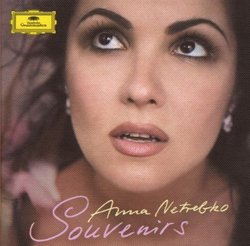| All Artists: Anna Netrebko, Elina Garanca, Piotr Beczala, Andrew Swait Title: Souvenirs (Deluxe Edition) Members Wishing: 0 Total Copies: 0 Label: Deutsche Grammophon Original Release Date: 1/1/2008 Re-Release Date: 11/11/2008 Album Type: Limited Edition Genres: Pop, Classical Styles: Vocal Pop, Opera & Classical Vocal, Historical Periods, Early Music, Modern, 20th, & 21st Century Number of Discs: 2 SwapaCD Credits: 2 UPC: 028947774518 |
Search - Anna Netrebko, Elina Garanca, Piotr Beczala :: Souvenirs (Deluxe Edition)
 | Anna Netrebko, Elina Garanca, Piotr Beczala Souvenirs (Deluxe Edition) Genres: Pop, Classical
On her fourth album for Deutsche Grammophon, opera superstar Anna Netrebko gives a very personal and intimate performance of cherished lighter works. From sparkling operetta classics to seductive salon songs, each selectio... more » |
Larger Image |
CD DetailsSynopsis
Album Description On her fourth album for Deutsche Grammophon, opera superstar Anna Netrebko gives a very personal and intimate performance of cherished lighter works. From sparkling operetta classics to seductive salon songs, each selection comes with a special memory for Netrebko. Netrebko is joined by some friends, El?¯na Garanc?a and Piotr Beczala-- her joy of collaboration is heard in these magnificent selections. Anna Netrebko is one of DG's best-selling artists and consistently performs in sold-out opera houses and concert halls around the world. She returns to the Metropolitan Opera in January 2009 in Lucia di Lammermoor. Available in a special, deluxe limited edition package! The beautiful cap box includes the CD; a DVD of behind-the-scenes footage, interviews and musical excerpts; beautiful booklet; three postcards and one poster of Netrebko. A must-have for Netrebko fans and the perfect holiday gift! Similar CDs
|
CD ReviewsA refreshing recital with mass appeal Santa Fe Listener | Santa Fe, NM USA | 11/11/2008 (4 out of 5 stars) "Behind the Vogue magazine cover photo and the fan-based DVD and promotionals, we have a vocal recital to deal with. The best thing about Anna Netrebko is that she isn't all image, lovely as hers is. She's bidding to join Angela Gheorghiu as a permanent opera star with a lasting legacy. One requirement in that ascendency is to release an album of crossover mass apeal while still remaining respectably opratic. This refreshing CD sets out to accomplish that and generally succeeds. The listener is softened up with three operetta lollipops to start off. Like Gheorghiu, Netrebko was trained to have a Slavic voice. Both sopranos work hard to ovrcome the drawbacks of the Slavic sound, which is darker, more throaty and chesty than Western opera voices. I don't know if Netrebko has gotten all the way -- her Lehar and Kalman heroines sound as if they are from Eastern Europe more than Vienna or Paris. She has yet to find light-hearted charm. "Depuis le jour" puts in a bid for comparison with famous accounts from the young Leontyne Price and Kiri Te Kanawa, who were knockouts in this aria. Netrebko isn't -- she lacks that thrilling, ethereal extension on top that makes the listener float away. But she's certainly lovely to listen to in her own right. The Barcarolle from "Tales of Hoffmann" suits her better; it's soulful and dreamy, a good combination for her temperament. As the program unfolds, we hit all the right beats for a mass-appeal album but with sidelong glances to the more knowing. Richard Strauss's "Caecille" is one of his most sumptuous orchestrated songs, and here Netrebko is thrilling, beyond reproach even if her German is sketchy. And so it goes. "Solveig's Song" is close enough to Slavic in mood that it brings out her best side, as do the items by Dvorak and (naturally) Rimsky-Korsakov. What does it all add up to? I think the public will continue to love their new diva, but eveen for us grumpy connoisseurs, who have been holding out a bit, there's a bright light. When Netreboko stops being all things to all people, what she actually is is a fine Slavic soprano with potential in French and German music. DG pushed Netrebko into Verdi and Puccini because that's where the limelight shines. In the end, however, they will do full justice by showing off her strongest suit, not her most glamorous (and profitable)." Voice of many colors Constantine A. Papas | 12/15/2008 (5 out of 5 stars) "Netrebko, glamour, publicity and hype notwithstanding, continues to develop and mature as a vocal artist, reaching new interpretive heights-like in the Russian Album- in non-standard operatic repertoire. The voice is luscious, and the top notes (Depuis Le Jour and Pie Jesu) are clean and effortless, with a totally controlled breathing technique. Her low range has expanded, while maintains nobility and depth. Some sopranos'-no names please!- low tessitura is either inaudible, flat or vulgar. Some question the "slavic" color of Netrebko's voice. I personally love it. It gives the voice certain degree of darkness that translates into passion and introspectiveness. The companion DVD is fan to watch, too. The set is highly recommended, if you aren't in the mood to listen to structured operatic CDs." Netrebko at her best Dino Starcevic Rivera | San José, Costa Rica | 01/05/2009 (5 out of 5 stars) "So far (sure it will be more and more) this is the best Netrebko collection. What a beautiful voice and dignifying performances (the rest of the singer too). It is hard to pick a favorite selection and, at the end, it unnecessary: from Kálmán to Arditi deserve to be heard once and once. Superb.
Deluxe Edition worth the price and, for a fan, the DVD and the rest of stuff is more than a bonus. A must, again." |

 Track Listings (18) - Disc #1
Track Listings (18) - Disc #1


